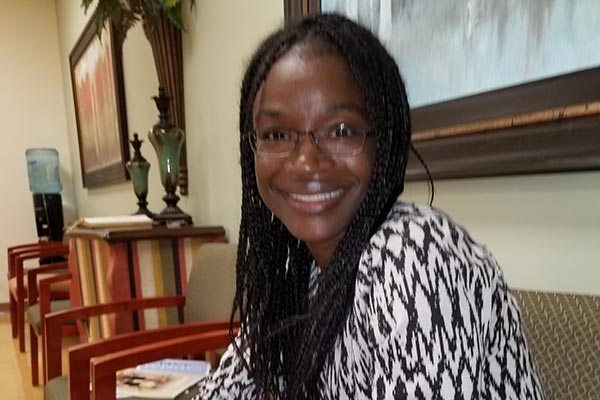Iris Davis

“Things come up, but stay strong.”
College: Communication and Information
Degree Program: Communication Science and Disorders
Degree: Doctorate
Award: TCC High Impact Practices Grant (2018)
Why FSU?
I wanted to stay here because I love what FSU’s College of Communication and Information has to offer. In the time that I’ve been here, I’ve met a lot of teachers who were really, really positive people in my undergrad program. I remember one of my professors in one of my last programs to finish my degree. He was just really inspirational, and he was very encouraging and telling me how there were things that I could do more than what I was even hoping to do at the time, and just having somebody believe in me, and continuing to see that in other teachers as well, kept me here.
What motivated you to pursue a graduate degree?
During my time as an undergraduate, mentorship became an important component of my decision to pursue a graduate degree. Toward the end of my program, a professor provided support and encouragement, which eventually translated into a job on campus where I was supervising 100 undergraduate students. I'm a naturally shy person, so I did not see that in myself to be able to lead a group of people who were, in some cases, only two or three years younger than I was at the time. But he saw that in me, and he helped me with building that part of myself. I always saw myself as really shy, and just having him believe in me and telling me about some of the characteristics I have as a person who could contribute to that group was one of the greatest things I had someone do for me.
Importance of your research and work:
My research right now, I'm going into the community, and I'm training early childhood educators on how to recognize the early signs of autism. As of now, autism is typically diagnosed when the child is four to five years old, but that's a really late age because the youngest age we can diagnose right now is at about eighteen to twenty-four months. In many cases these kids are making their way to elementary school, and maybe someone saw the signs or saw something, but in many cases they're not being diagnosed until they're older. So, I'm hoping to get early childhood teachers to know what these signs are. They can then alert a doctor or a parent or someone to help these children with getting intervention earlier, because we know that their outcomes are going to be much better if we catch them early and start treating them early.
Briefly describe your career aspirations.
I'm hoping to get early childhood teachers to know what these signs are, so they can alert a doctor or a parent or someone to help these children with getting early intervention earlier because we know that their outcomes are going to be much better if we catch them early and start treating them early. I'm also interested in just training early childhood educator, just helping to empower them, because I feel like they're some of our most important teachers, but in a lot of ways when it comes to what they're paid when it comes to how society sees them, they're the most undervalued.
Advice for anyone considering graduate school.
I would tell them to definitely find something they love and something that they are willing to study for a long time. Especially if you decide to go into a PhD program, it's not like where you take a class and then it's over. This endeavor is something that you continue. And sometimes, you're working on your project or your area of study for many semesters, maybe even two or three years. You want to love what you're doing. I think the biggest word of advice is, just don't give up. Things are going to get tough, and life is going to happen. But I feel like sometimes when the challenges come, it helps you to see how strong you are.
Career aspirations
I’m interested in training early childhood educators. I want to help empower them, because I feel like they’re some of our most important teachers, but in a lot of ways, when it comes to what they’re paid and how society sees them, they’re the most undervalued.
Accomplishments during graduate career
I’m really passionate about this work because, for one thing, my four year old ended up being one of those statistics who we caught very late with autism, and I can remember seeing the signs early. I feel like everyone who’s involved in the childcare network has to know the signs, so we can all work together with a team to help children get diagnosed and get the help they need. So, she is one of the reasons why I’m very passionate about educating teachers about autism and also being a mom. When things get really tough, and sometimes, they do with life and going to school, I just remind myself that anything worth having doesn’t come without struggle. And sometimes, when you’re feeling the struggle, you’re getting closer to the product.
